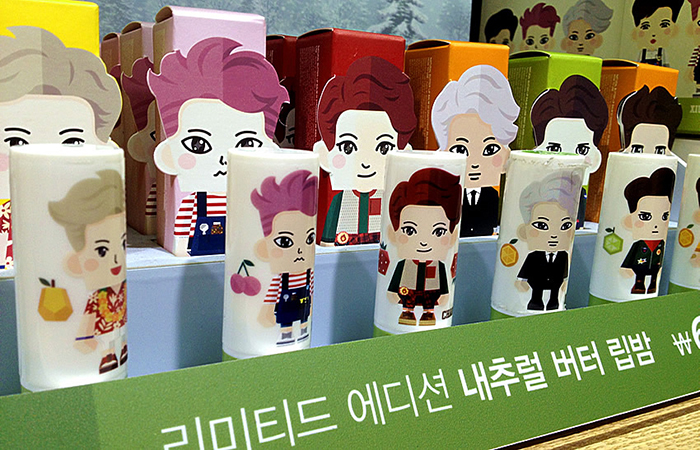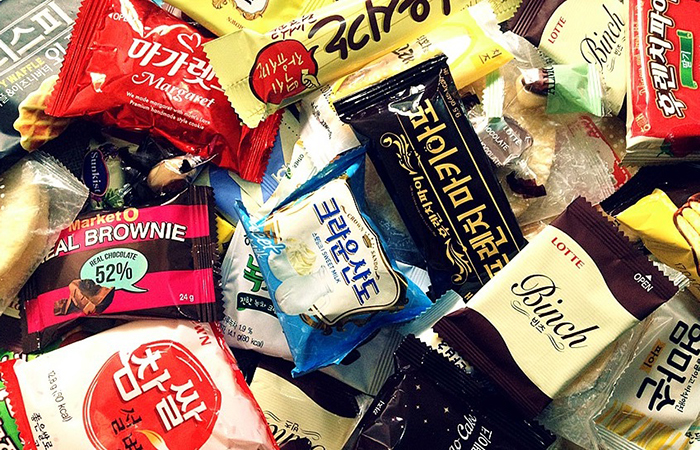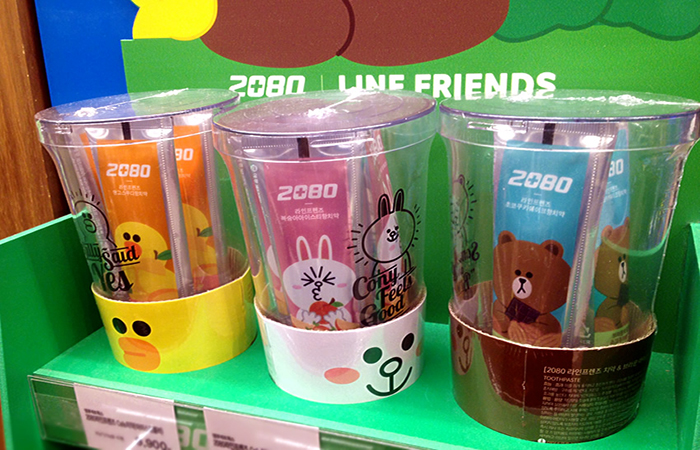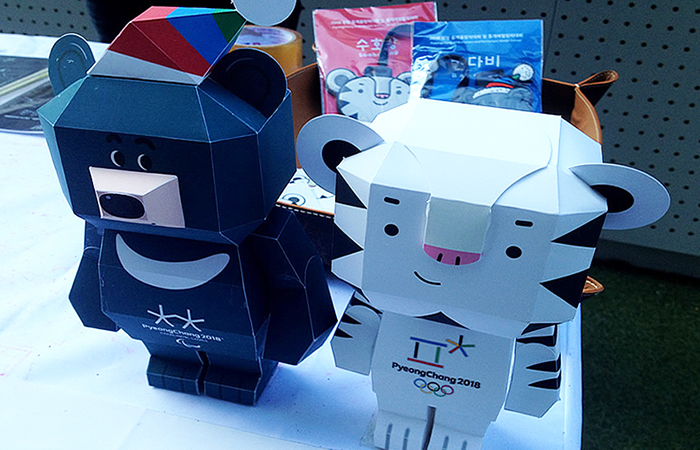View this article in another language
- 한국어
- English
- 日本語
- 中文
- العربية
- Español
- Français
- Deutsch
- Pусский
- Tiếng Việt
- Indonesian

A limited-edition product line of a popular beauty and cosmetic brand is a collaboration with Exo, a pop group.
By Korea.net Honorary Reporter John Paul Vergonia from the Philippines
Photos = John Paul Vergonia
Korean exports are spreading quickly and have made the jump to become globally competitive. We can see Korean goods and services everywhere and we continue to enjoy them as part of our daily lives, which only proves that the influence of Korean manufacturing and its culture industry is constantly prospering from its own domestic success and thriving to reach more in the global marketplace. Why are brands from Korean companies popular? Is it related only to product quality, branding approach or to marketing strategy? Or to all of them? What makes a product made in a Korean factory unique from products made in factories that are located elsewhere? Let’s discover some of the most popular brands today from Korean companies and explore the world of Korean branding.
At present, Korean goods and services are popular with many people around the globe, whether it’s foods, makeup, clothes, tech gadgets or pop culture and media. The quality of the product is the most important thing and the most competitive issue that consumers carefully consider before purchasing or consuming said item. As a factor affecting the company-consumer relationship, quality is still valued first at the top of the list, whether you're on the business side or simply the end-user. Based on personal experiences, Korean companies produce products that are economical and reasonably priced, in the sense that the quality is worthy of attention. This is the utmost consideration by most companies today. Quality is given, but besides this important factor, which differentiates products from Korean companies from products from companies from other countries, is the branding, which adds value and identity within a market place.
Local consumer trends have a huge influence on the success of a brand in Korea, where most of the relevant businesses are integrating their own brands. By way of illustration, take a look at the businesses located along the neighborhood of Insadong in central Seoul. As the main tourist street that sells "traditional" trinkets in the capital city, the branding of the shops and restaurants there is quite relevant to their success, especially the souvenir shops that sell replica antiques and the "traditional" restaurants that serve "authentic" Korean food. Despite the modern atmosphere of the place, it still maintains some significance through name branding, managing to attract and to appeal not just to Seoulites but to international tourists, too. Besides, brands that use pure Korean to showcase their identity in the local market are just as effective at introducing their made-in-Korea products overseas. This is the case with Jinro’s widely consumed soju brand Chamisul (참이슬), Chung Jung One’s popular hot chili paste Sunchang (순창), or the processed food company Ottogi (오뚜기) that dominates over other brands when it comes to food additives. All are representations of Korea’s rich business environment and thus create a truly Korean feel for consumers.

Some of the most popular Korean snacks are known for their products, innovations and attractive labeling.
Korean processed food companies are persistently working on innovation when it comes to product branding. From the packaging to the product itself, the chemicals and materials used are all of high quality and the food products have consistent branding strategies that attract the interest of many consumers. Sweets, cookies, instant noodles, flavored milks and soft drinks: most of the brands in these categories, like Lotte or Orion, are consistent in product innovations and have effective branding and marketing strategies.
One example is the product branding used by SM Town, a promotional center for the pop music label SM Entertainment. If you've already visited the place, especially the souvenir shop and the cafe, you'll notice that most of the items being sold there are in collaboration with other corporate brands. Despite the fact that most of the items there are quite expensive, as SM Town is a popular pop music brand with strong equity in the market, which enables it to charge more for its products, still, many fans are likely to buy them over other brands that have similar offerings. You'll also notice this yourself when grocery shopping in Korea. When one item is part of some current trend and the product branding is more attractive than other products, the possibility is that you'll be tempted to buy it and pay more for it, especially if a famous celebrity is on the label. This interesting consumer habit proves that, in addition to quality, product branding is a key factor, and also that emotional connection to celebrities can be used to sell more product.
Popular chatting apps like Line and Kakao Talk are also aware of the strength of branding and local consumer trends. Both use a bunch of cartoon characters to promote their apps and other products. Many consumers enjoy the benefits of these apps and can accept some product branding, as such marketing approaches play a significant part in making the apps globally popular. Branded apps, along with the featured cartoon characters, are not just merely about app software, but are considered to be icons with which consumers have bonded, bubbly friends we see in various promotional videos endorsing this or that good or service, as they are really effective at conveying a message. Seoul is home to complete stores and even cafés that are dedicated solely to these sets of cartoon characters. Many domestic consumers and tourists consider them to be hit attractions, too. Branding an app with a cartoon character is one way to promote the app, trying to build on the trend of cartoons being used in branding all across the Korean economy. This goes as well with the recent success of the PyeongChang 2018 Olympic and Paralympic Winter Games. The official mascots, Soohorang and Bandabi, were used to promote the global sporting event as a whole. Branding is also about expressive labelling that makes one product stand out above other equal products.
Makeup and skin care products that are made in Korea are popular, as for the most part they aren't that expensive and they're branded as being "natural" or more effective and less harmful. How did these beauty brands become known in the industry? Is product quality the sole factor? How about price, brand name, or marketing style? Again, it isn’t only about one aspect, but a combination of all these important things that determine whether a brand plays a big part in the success or failure of a product in the market.
For instance, the makeup brands Innisfree, Laneige and Nature Republic all have some premium products that are sold at higher prices, that are introduced as luxurious items. These three brands are also consistent in both their business promotions and their marketing images. They create a solid, single brand image in the marketplace. These brands have tapped popular celebrities, too, who are often regarded as trendsetters. That can have a great impact on helping this product or that product stand-out from the others. Also, notice that the names of these Korean brands are not in Korean, but in English. As Korea is a small market for businesses, and with a growing interest in Korea for things from the rest of the world, this branding strategy -- to use English -- is a way to reach a global market. Some of these brands have actually successfully gotten a hold of some international fame this way.

Naver's chatting app Line has its own set of cartoon characters, all of which can be used to brand all sorts of products, including plastic cups.

The PyeongChang 2018 Olympic and Paralympic Winter Games were rife with corporate branding, including use of the two official mascots, Soohorang and Bandabi, hoping to lure in tourists and to effectively promote the corporations that sponsor the Olympics.
Tech giants Samsung and LG, as well as Hyundai, are just a few of today’s most successful global companies, and they all have strong brands. These companies are well-known across various industries, providing high-end smartphones, up-to-date tech gadgets, and top-class vehicles. Behind these modern advances is an effective name-branding campaign, which plays a key role in each business victory. Accurately branding their products with names that use only a few English letters is very effective. Kia, a subsidiary of Hyundai, which is also a globally known car maker, is a good example of effective branding. The company adopted a catchy, unique name that consumers can easily remember. Furthermore, combined with a tried and tested marketing plan, such as sponsoring a TV show or tapping a famous artist to be a product ambassador, Kia has shown how companies can maximize their presence in mainstream media, to help their brand reach even farther. These home-grown brands have successfully established an international image not only with innovative goods, but also with strong branding. Branding is about naming trends, per se.
In addition to a brand’s own initiative to grow successfully in a market, the Korean government continues to support many of them in aim to help Korea-made goods be globally competitive, and, of course, to boost exports. Korea is continuously encouraging local industry to create its own brands instead of just distributing generic products from other countries. With the effort and significant resources that the government offers in this long-term export-support policy, many Korean companies have successfully become some of the world’s top recognizable brands. Hopefully, the continual growth of the Korean economy, which has been going on for so many years now, will be able to be continued with these efforts.
With the Korean government's endless efforts to support local brands, and with many pop industry products and cultural content exports being at the top of the charts, Korea has been able to maintain its own national brand that supports not just the tourism industry, but also the persistent success of pop industry exports, as can be seen with the growing popularity of Korean TV shows, movies and pop music in East Asia and elsewhere. Such soft power is gaining praise from many people around the world. One pop group, BTS, has achieved an enormous success on the global entertainment stage as the pop group that breaks history every once in a while and tops various music charts worldwide. Branding, along with effective marketing, plays a major role in consumers' love of BTS. The pop group has ended up becoming an international sensation as part of this craze. With the growing acceptance and continuous fame of pop music and TV shows coming out of Korean studios, it shows that the effective branding of the entire country will certainly help and affect a single company to be widely known within its field, marketplace or industry. This combination that is "Korea" has proven once again to be one of the top brands in the world, from cars to pop music.
The quality of goods and services made by Korean companies, together with low costs, effective branding, and well-planned marketing strategies, has a huge impact on the success of a particular brand. Branding is not just about one thing, as you need all of these key aspects to make your product as a whole stand-out from the others. Many well-known Korean brands have taken a risk to increase their reach, and they've since found global success.
wisdom117@korea.kr
* This article is written by a Korea.net Honorary Reporter. Our group of Honorary Reporters are from all around the world, and they share with Korea.net their love and passion for all things Korean.
Most popular
- Military discharge sets stage for reunion of all 7 BTS members
- 'We are back!' BTS Festa heralds hyped return of K-pop phenom
- K-pop streaming on Spotify skyrockets 470-fold in 10 years
- Presidents Lee, Trump discuss tariff deal in first phone talks
- President Lee leaves for G7 Summit in Canada on first int'l trip
